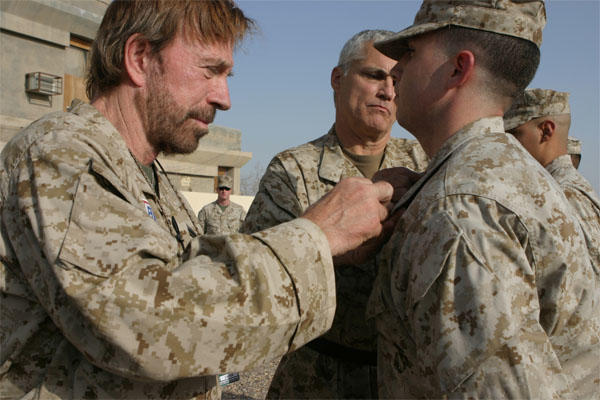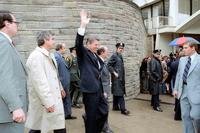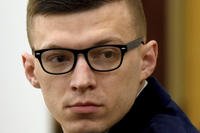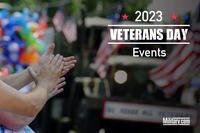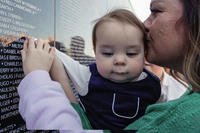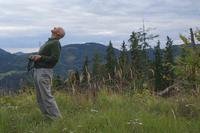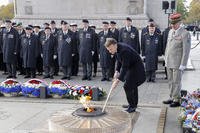There is no one right way to thrive after serving in the military. Veterans get a life-changing experience while serving, along with the education and training benefits for which they sign up. These benefits and experiences can lead to almost anything, especially with the courage and commitment instilled in vets during their service.
Some veterans on this list might never have become who they are or were without serving in the military. Some of them found the military wasn’t what they thought it would be. All of them were changed by their service, and we are all better off for it.
10. George Carlin
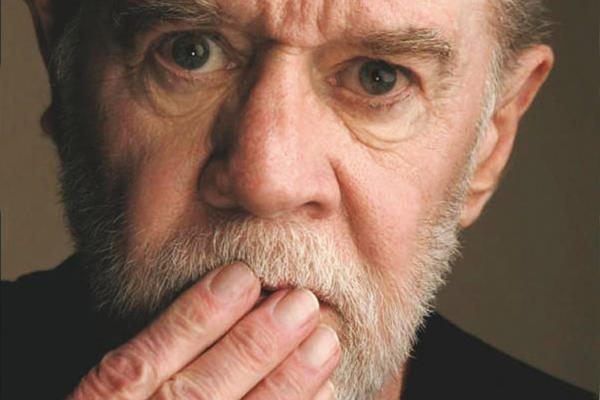
"So I do have this ambivalence. Obviously I'm against militaries because of what militaries do. In many ways, though, the Air Force was unmilitary-like. They dropped bombs on people, but … they had a golf course."
The creator of "Seven Words You Can Never Say on Television" was always an anti-establishment comedian. So it might not be surprising that a guy like George Carlin was considered an “unproductive airman” during his time in the U.S. military. It’s probably more of a surprise that he ever joined the military at all.
Carlin dropped out of high school in 1954 and joined the Air Force to get GI Bill benefits and attend broadcasting school. He was trained as a radar technician and stationed at Barksdale Air Force Base in Bossier City, Louisiana. He wasn’t content with just doing his Air Force job, either. He moonlighted as a disc jockey at KJOE, an AM radio station that played Top 40 music, in nearby Shreveport. By age 18, Carlin was on the air.
Apparently, he wasn’t content to do his Air Force job at all. Carlin was court-martialed three times during his career and eventually was given a general discharge. Avoiding a dishonorable discharge was something he was proud of, but Carlin credits his confidence to those early days in radio.
After a couple of years working in broadcast radio, he moved west to California, where he found his enduring fame. Three years after his discharge, he found himself on television in Los Angeles. His frequent appearances on "The Tonight Show" with Jack Paar made him famous. By the 1970s, he had ditched the clean-cut appearance of traditional comics and began sporting his trademark beard and long hair.
9. Steve McQueen
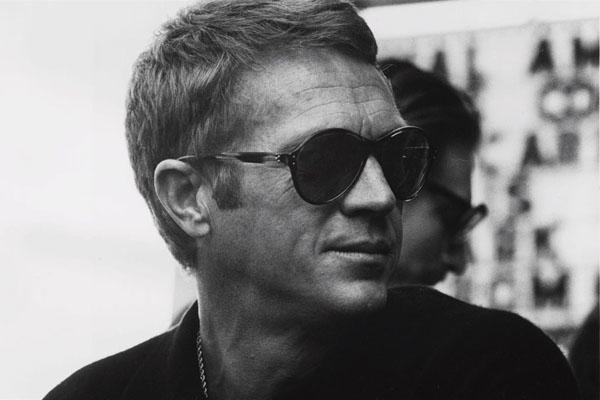
"It was all very pleasant just lying in the sun and watching the girls go by, but one day I suddenly felt bored with hanging around and went and joined the Marines."
Steve McQueen's legacy as the "King of Cool" began early. He was the love child of a stunt pilot and an alleged alcoholic prostitute, and had a childhood that led him to cultivate his rebel image, which included stints of homelessness and time in a boys reformatory.
After a series of jobs that included working the door at a brothel in the Dominican Republic, he joined the Marines in 1947. He was promoted to private first class and served with an armored unit. McQueen saw some success, being promoted six times -- and demoted back to private seven times.
His rebellious nature came to a head when he let a weekend pass turn into a two-week tryst with his girlfriend. Shore patrol apprehended him, but he resisted and spent 41 days in the brig; the first 21 were spent living off bread and water.
After his time in the brig, McQueen righted the ship, literally. His unit was in the middle of a training exercise in the Arctic that turned disastrous. McQueen, his unit and their tanks were aboard a ship when it hit a sandbank, throwing several tanks and their crews into the water. Many drowned inside their tanks, but McQueen jumped in and saved the lives of five men.
Because of his heroism, McQueen was chosen to the Honor Guard protecting President Harry Truman's yacht. McQueen stayed in the Corps until 1950 when he was honorably discharged. "The Marines gave me discipline I could live with. By the time I got out, I could deal with things on a more realistic level. All in all, despite my problems, I liked my time in the Marines," McQueen said.
After leaving the Marines, McQueen used money earned through the GI Bill to study acting at Sanford Meisner's Neighborhood Playhouse. His career was prolific. McQueen starred in numerous roles and maintained his star status up until his death in 1980.
8. Ice-T

"When I had my daughter, I was like, man, I'm going to go to jail, I got to do something, and I went to an enlistment office. Next thing you know, I'm in the military, four years infantry."
Sometimes people join the military for purely practical reasons, and actor and musician Ice-T is one of them. After a rough upbringing in South Los Angeles, Tracy Lauren Marrow, soon to earn the nickname Ice-T because of his ability to perform books written by a famous pimp named Iceberg Slim, was struggling to support his girlfriend and daughter. He joined the Army for the financial benefits. His performing ability would help him later in life, too.
He served four years in the 25th Infantry Division in Hawaii. Early in his career, he was part of a group that stole an infantry rug and subsequently deserted. After a month, once the rug had been recovered, Ice-T returned and received a non-judicial punishment, which allowed him to complete Advanced Infantry Training. But he did get his sign-on bonus of $2,500.
During his time in Hawaii, Ice-T was assigned as a squad leader at Schofield Barracks. It was there that he met a civilian named Mac who was impressed by his performances of Iceberg Slim’s books. The civilian, he learned, was a pimp himself. Mac taught him how to be a pimp while he was still serving in the military.
Using the money from his illicit side hustle, Ice-T purchased stereo equipment, turntables, a mixer and speakers. That’s how he began performing and rapping. At one point during his career, a sergeant told Ice-T that he was serving in the Army because he couldn't survive on his own in the civilian world. Ice-T nearly proved him right; he became a jewel thief and bank robber after leaving the Army in 1979.
After two of his friends went to prison for robbery, Ice-T officially adopted his name and became a DJ and performer. In 1983, he recorded his first single, "Cold Wind Madness," which became an underground hit.
7. Humphrey Bogart
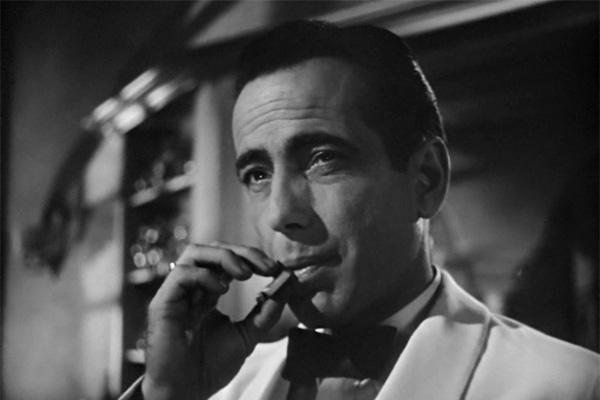
“Bogie” was the son of a surgeon and a famous illustrator in New York City, part of a family that could trace its lineage back to the Mayflower itself. He was raised in boarding schools and elite private schools, and when the time came to go to college, Humphrey Bogart was expected to attend Yale.
But Bogart eschewed his upbringing and went to a different school, dropped out and joined the U.S. Navy in 1918, while World War I was raging in Europe. It was said that he received his trademark scar and lisp while in the Navy, when his ship, the USS Leviathan, was shelled while ferrying troops.
Much of Bogart’s time at sea came after the Armistice of November 1918, as he worked aboard the troopship carrying U.S. troops back home. In June 1919, he was discharged as a boatswain’s mate third class.
When he returned home, he found his family’s vast wealth was failing due to bad investments. He made his own way and began working in a series of jobs and joined the Coast Guard Reserve. One of those jobs was in the office of New World Films as a stage manager, and Bogart soon took to acting on Broadway.
Eventually, through a childhood friend, he worked his way onto the silver screen, and his roles veered toward tough-guy heroes and gangsters, which became a guidepost for the rest of his career. He starred in classics such as "The Maltese Falcon" and "Casablanca," and won an Academy Award for Best Actor for “The African Queen.”
6. Morgan Freeman
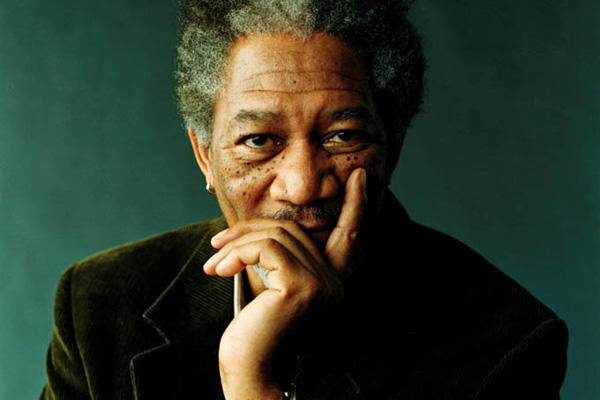
"I joined the Air Force. I took to it immediately when I arrived there. I did three years, eight months and 10 days in all, but it took me a year and a half to get disabused of my romantic notions about it."
Sometimes being in the military helps determine what you want to be in life -- even if it means not being in the military. Talented, young Morgan Freeman was so in love with the idea of flying that he joined the U.S. Air Force in 1955 instead of accepting a scholarship for drama from Jackson State University in Mississippi.
Eventually, he got the chance to train as a fighter pilot, but as soon as he sat in the cockpit of what he thought would be his dream job, he felt like he was "sitting in the nose of a bomb," as he told AARP magazine. "I had this very clear epiphany ... You are not in love with this; you are in love with the idea of this." Freeman didn’t hesitate to act on his gut instinct and left the Air Force in 1959.
It would be a long, hard road to stardom for Freeman as he acted for more than 20 years on stage before gaining fame on television in the soap opera "Another World" and the long-running children's program, "The Electric Company." Freeman went on to act in prominent supporting roles and later as a star in such movies as "The Shawshank Redemption," "Seven" and "Unforgiven."
5. Chuck Norris
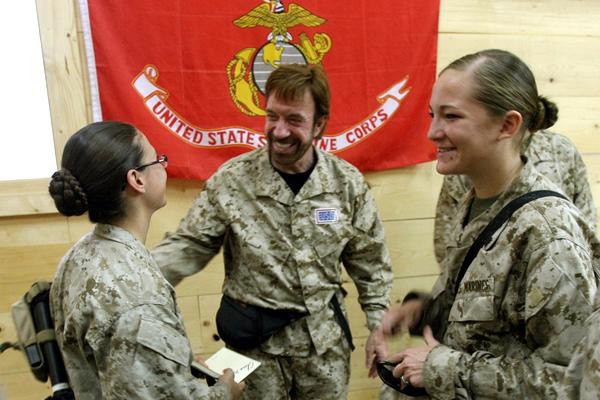
"Before the president of the United States can declare war, Congress must have permission from Chuck Norris."
Before Carlos Ray Norris could become the Chuck Norris, he had to learn a few things first. Like many of us reading this, he did it in the military. Norris joined the Air Force, where the first thing he learned was that he needed a weapon to do his job as a security policeman.
While stationed in Korea, part of his job meant corralling rowdy, drunken service members out of bars near Osan Air Base. When he realized that he couldn’t do it physically, he sought help in the local martial arts, tang soo do and taekwondo.
As we all know now, Norris doesn’t half-ass anything. He would not only learn to toss drunks around, but also became the first Westerner to be awarded an eighth-degree black belt in taekwondo. He held the world middleweight karate champion title for six years and was chosen "Black Belt" magazine's "Fighter of the Year" in 1969. He founded 32 martial arts schools and was actor and fellow veteran Steve McQueen's karate teacher -- because, of course, he was.
McQueen encouraged Norris to go into acting, and after gaining attention as Bruce Lee's opponent in "Way of the Dragon," he starred in such films as "Good Guys Wear Black," "Delta Force" and "Missing in Action." He also starred in the long-running TV series, "Walker, Texas Ranger."
Norris has used his success to give back to the military community, serving as a spokesman on behalf of the Department of Veterans Affairs and hospitalized veterans. On March 28, 2007, Commandant Gen. James T. Conway made Norris an honorary United States Marine.
4. Mr. T
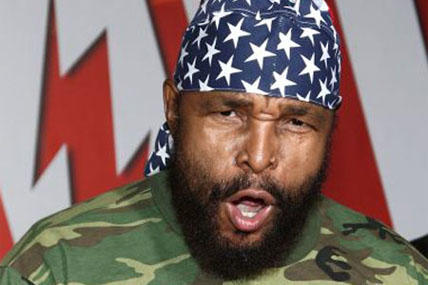
"When you find a really tough guy, he's not a predator. He doesn't have to prove himself. Guys who have to pretend to be tough, they ain't. I'm tough."
Before he nearly pounded Rocky Balboa into submission as Clubber Lang in “Rocky III” and went on to fame as B.A. Baracus on the hit TV show “The A-Team,” Mr. T was a member of the biggest team of them all -- the U.S. Army.
Originally known as Laurence Tureaud, Mr. T served in the Army's Military Police Corps in the mid-1970s, and he was a good soldier. In November 1975, he was awarded a letter of recommendation by his drill sergeant, and in a cycle of six thousand troops, he was elected "Top Trainee of the Cycle" and promoted to squad leader.
He was even good at his punishments. In July 1976, his platoon sergeant punished him by giving him the detail of chopping down trees during training camp at Fort McCoy in Wisconsin. The sergeant did not specify how many trees that were to be cut down, though, so Mr. T chopped down more than 70 trees in the span of 3½ hours before being relieved of the detail.
After his discharge from the Army, he tried out for the NFL's Green Bay Packers but failed to make the team because of a knee injury. However, his Army police training served him well in his next job, as a bouncer at Chicago nightclubs, where he began cultivating his ultra-tough persona. He later became the first "celebrity bodyguard," protecting celebrities like Steve McQueen, who seems to be a great guy to know, judging by this list. .
Through his bodyguard and bouncing work, Mr. T was discovered by Sylvester Stallone, who cast him as Lang in the third “Rocky” movie. His career took off from there, and he became one of the most iconic personalities of the 1980s.
3. Johnny Cash

"That was the big thing when I was growing up, singing on the radio. The extent of my dream was to sing on the radio station in Memphis. Even when I got out of the Air Force in 1954, I came right back to Memphis and started knocking on doors at the radio station."
The legendary country performer is known as the "Man in Black," but he was also a man in Air Force blues. Fresh out of high school in 1950, Cash joined the Air Force as the Korean War began, but spent most of his four-year enlistment in Germany. Perhaps not surprisingly for a man with music in his veins, Cash was handy when it came to the rhythms of Morse code, and served as an intercept operator with the USAF Security Service. He was even the first person in the West to know that Soviet dictator Joseph Stalin had died in 1953.
If it wasn’t for the Air Force, we might never have known Johnny Cash. Coming from a poor background of Arkansas cotton workers, he could afford to buy a guitar only after he started receiving military pay. He purchased his first guitar at the Base Exchange in Germany. Even his famous “Folsom Prison Blues” came from a documentary he watched at the base theater.
He also formed his first band while in the Air Force, the Landsberg Barbarians, and began playing to packed officer’s clubs. When Staff Sgt. Cash was discharged in 1954, he used his GI Bill benefits to take a radio announcing course at a broadcasting school in Memphis, Tennessee, and one day walked into Sun Records Recording Studio to sell tracks to producer Sam Phillips. His career took off from there.
Although Cash's reputation as a hard-living rebel overshadowed his time in service, he never forgot where he came from, and years later, he met a young Army veteran named Kris Kristofferson when Kristofferson landed a helicopter on his front lawn. Cash would not only not shoot the helicopter down, as Kristofferson feared, Cash listened to his music and helped launch his career.
2. Clint Eastwood
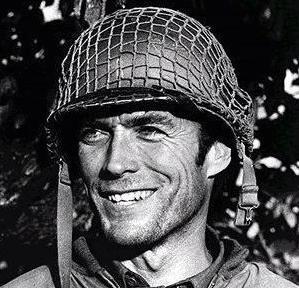
"I was drafted during the Korean War. None of us wanted to go ... It was only a couple of years after World War II had ended. We said, 'Wait a second? Didn't we just get through with that?'"
Long before Clint Eastwood dared anyone to make his day in “Dirty Harry,” he served in the Army at Fort Ord, California. Although he was drafted during the fighting in Korea in 1951, he spent his entire military career as a swimming instructor.
The swim training he doled out to his fellow soldiers was solid. In the years before he was drafted, Eastwood worked a number of jobs, including as a firefighter and lifeguard. Military service may have saved him from a lifetime of these jobs and given the rest of us a lifetime of cinematic gold.
As fate (and luck) would have it, his swimming skills would come in handy. One year, as Eastwood was hitching a ride aboard a Navy torpedo bomber, the plane ran out of gas and was forced to ditch in the Pacific Ocean approximately three miles off Point Reyes Station, California. Eastwood and the pilot used the life raft to swim more than a mile through the tide to shore.
It was at Fort Ord that Eastwood was first introduced to Hollywood types, who were impressed with his look but not his acting abilities. Not a big deal; after his discharge in 1953, Eastwood attended L.A. City College and studied drama using the GI Bill. By April 1954, he had received his first studio contract. He eventually found international fame in Italian-made "spaghetti" westerns, which established his hard-boiled persona and a more than 60-year career in Hollywood.
1. Elvis Presley
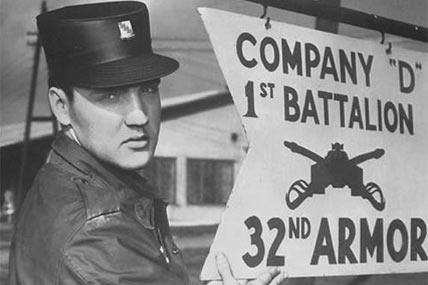
"The Army teaches boys to think like men."
By the time Elvis Presley was drafted into the U.S. Army, he was already one of America’s biggest stars, with a string of hit songs, movies and memorable TV performances under his belt. So when he received a draft notice, qualified as a 1-A draftee and then actually joined the Army, it was sensational news.
Presley didn't shirk from his duty and found himself trading in his leather jacket for Army greens. He entered the Army as a regular GI at Fort Chaffee, Arkansas, on March 24, 1958. As his famously tousled hair was shaved down to regulation length, he cracked, "Hair today, gone tomorrow."
Elvis was sent to Fort Hood for basic training and was assigned to the Second Armored Division, also known as “Hell On Wheels.” He later was assigned to the Third Armored Division and stationed in Friedberg, Germany. There, he met Priscilla Beaulieu, who eventually became his wife.
He also told the media that he wanted to be treated just like any other soldier, saying: "The Army can do anything it wants with me." Unlike most other soldiers, however, he used his leave to record 10 Top 40 hit songs, donated his Army pay to charity and purchased extra uniforms and equipment for his fellow soldiers.
By the time he finished his Army stint, Elvis had been promoted to sergeant, and he was honorably discharged from active duty on March 5, 1960, at Fort Dix, New Jersey.
Just prior to separating, Elvis reflected on his experiences in an interview for Armed Forces Radio and Television: "I was in a funny position. Actually, that's the only way it could be. People were expecting me to mess up, to goof up in one way or another. They thought I couldn't take it and so forth, and I was determined to go to any limits to prove otherwise, not only to the people who were wondering, but to myself."
-- Blake Stilwell can be reached at blake.stilwell@military.com. He can also be found on Twitter @blakestilwell or on Facebook.
Want to Know More About Veteran Jobs?
Be sure to get the latest news about post-military careers as well as critical info about veteran jobs and all the benefits of service. Subscribe to Military.com and receive customized updates delivered straight to your inbox.
